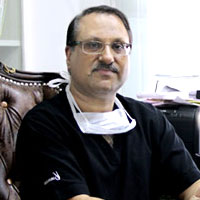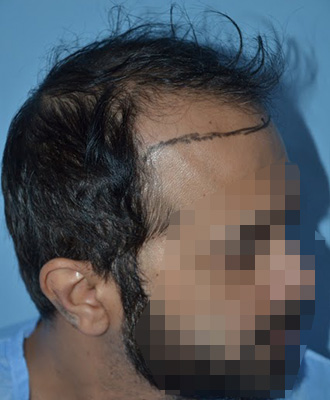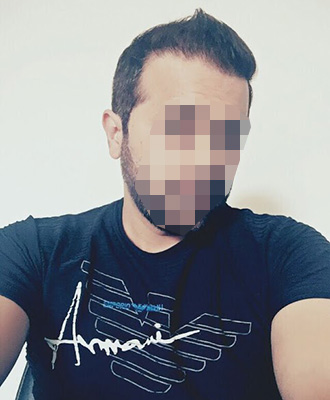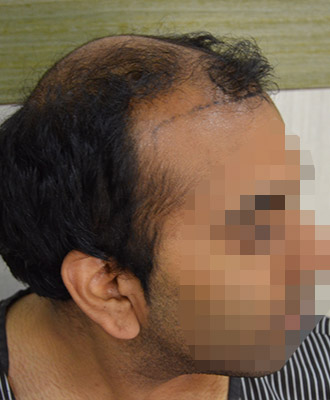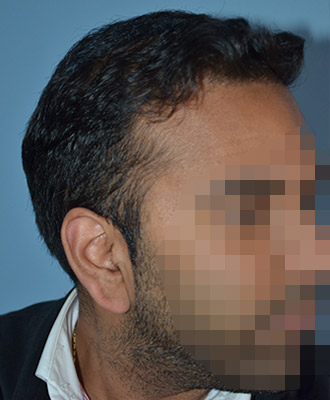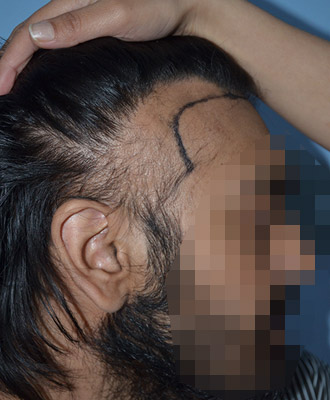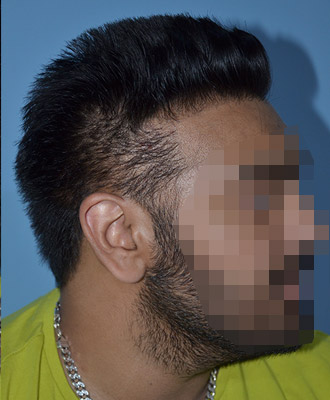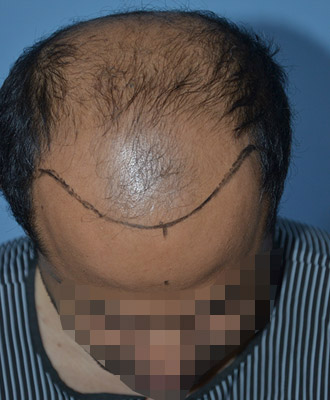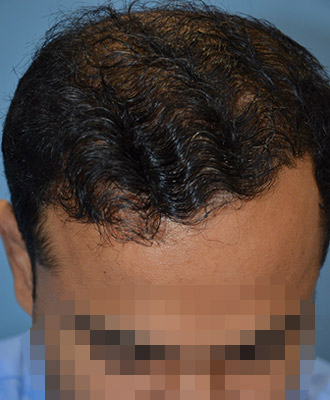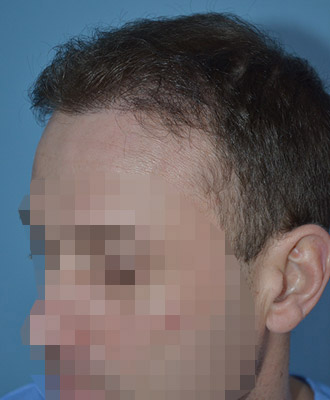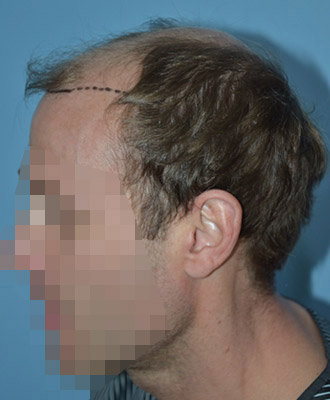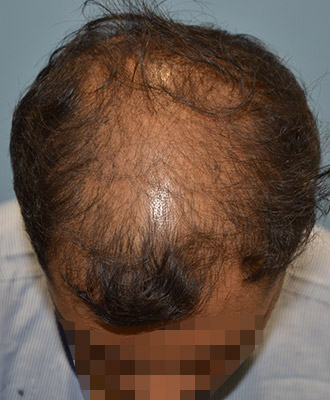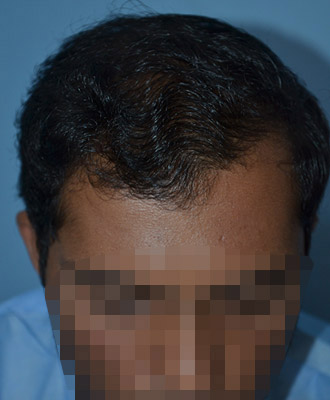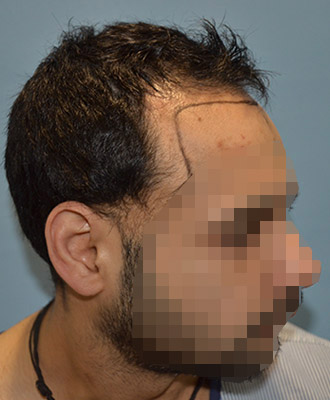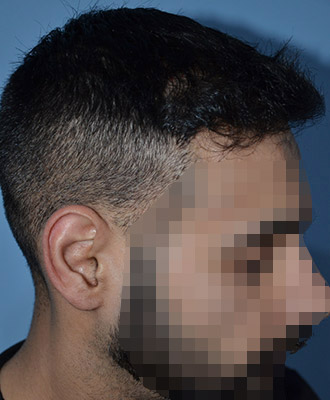Dr Tejinder Bhatti / Darling Buds Clinic - India
Dr Tejinder Bhatti’s Darling Buds Clinic, located at Chandigarh, India, is today regarded as one of the first international clinics totally dedicated to FUE hair transplant. It is the first clinic in the world, previously doing 100% FUT hair transplants, to completely transform into a ‘FUE only’ hair transplant center as long back as 2009. You are witness to the fact that the world over this change over is being replicated in clinics which were earlier doing FUT only. For, FUE has become a force to reckon with due to quality hair transplant results giving enviable, reproducible results, case after case. Today, FUE is the procedure of choice of a discerning client like you and many more.
Why clients come to Darling Buds, India?
You have done enough research and would know that Hair transplant cost in countries like USA, Brazil, Canada, UK, Bahrain, Dubai, South Africa, Australia, New Zealand and European countries like France, Switzerland, Spain, Germany ranges from USD 6,000- 22,000. With the downswing in economy, it has become difficult for the average client to afford a hair transplant at such costs in most countries. For the past 5 years, hair transplant services at the very best centers in India have become a force to reckon with as far as quality of care and results and pricing structure are concerned. Due to these reasons, clients suffering from hair loss are increasingly looking Eastwards for their hair transplant. This great demand has spurred the number of transplant procedures being done at Darling Buds.
Proud to be the "Official Surgeon" to Pollywood

Cost of FUE Hair Transplant in India
What package best suites your budget?
Premium package:
- INR 99 for scalp grafts and INR 179 for body grafts.
- 85% steps of the procedure by Dr Bhatti (100% counseling , 100% anesthesia administration, 100% harvesting,100% slit making)
- New imported punch used
- No lab charges/ Post care kit charges
- Free pick and drop while in Chandigarh to and from the clinic and for local sightseeing.
- No extra fee for "no shave" technique (ideal for those needing lesser than 1800 scalp grafts)
Standard package:
- INR 89 for scalp grafts and INR 169 for body grafts.
- 85% steps of the procedure by Dr Bhatti (100% counseling, 100% anesthesia administration, 100% harvesting,100% slit making)
- Used imported punch (however it is sterilised as other instruments also are)
- Post- procedure care kit cost and standard lab test charges – INR 5600
- Car pick up and drop in Chandigarh @ INR 27 per Km
- "No shave" technique : INR 20,000 shall be charged extra
Hair Transplantation Techniques
What is the normal cycle of hair growth and loss?
lf an inch) per month during this phase. About 90 percent of the hair on your scalp is growing at any one time. About 10 percent of the hair on your scalp, at any one time, is in a resting phase. After 2 to 3 months, the resting hair falls out and new hair starts to grow in its place.
It is normal to shed some hair each day as part of this cycle. However, some people may experience excessive (more than normal) hair loss. Hair loss of this type can affect men, women and children.

What causes excessive hair loss?
A number of things can cause excessive hair loss. For example, about 3 or 4 months after an illness or a major surgery, you may suddenly lose a large amount of hair. This hair loss is related to the stress of the illness and is temporary.
Hormonal problems may cause hair loss. If your thyroid gland is overactive or underactive, your hair may fall out. This hair loss usually can be helped by treatment thyroid disease. Hair loss may occur if male or female hormones, known as androgens and estrogens, are out of balance. Correcting the hormone imbalance may stop your hair loss.
Many women notice hair loss about 3 months after they’ve had a baby. This loss is also related to hormones. During pregnancy, high levels of certain hormones cause the body to keep hair that would normally fall out. When the hormones return to pre-pregnancy levels, that hair falls out and the normal cycle of growth and loss starts again.
Some medicines can cause hair loss. This type of hair loss improves when you stop taking the medicine. Medicines that can cause hair loss include blood thinners (also called anticoagulants), medicines used for gout, medicines used in chemotherapy to treat cancer, vitamin A (if too much is taken), birth control pills and antidepressants.
Certain infections can cause hair loss. Fungal infections of the scalp can cause hair loss in children. The infection is easily treated with antifungal medicines.
Finally, hair loss may occur as part of an underlying disease, such as lupus or diabetes. Since hair loss may be an early sign of a disease, it is important to find the cause so that it can be treated.
Can improper care of my hair cause hair loss?
Yes. If you wear pigtails or cornrows or use tight hair rollers, the pull on your hair can cause a type of hair loss called traction alopecia (say: al-oh-pee-sha). If the pulling is stopped before scarring of the scalp develops, your hair will grow back normally. However, scarring can cause permanent hair loss. Hot oil hair treatments or chemicals used in permanents (also called "perms") may cause inflammation (swelling) of the hair follicle, which can result in scarring and hair loss.
What is common baldness?
The term "common baldness" usually means male-pattern baldness, or permanent-pattern baldness. Male-pattern baldness is the most common cause of hair loss in men. Men who have this type of hair loss usually have inherited the trait. Men who start losing their hair at an early age tend to develop more extensive baldness. In male-pattern baldness, hair loss typically results in a receding hair line and baldness on the top of the head.
Women may develop female-pattern baldness. In this form of hair loss, the hair can become thin over the entire scalp.
Can my doctor do something to stop hair loss?
Perhaps. Your doctor will probably ask you some questions about your diet, any medicines you’re taking, whether you’ve had a recent illness and how you take care of your hair. If you’re a woman, your doctor may ask questions about your menstrual cycle, pregnancies and menopause. Your doctor may want to do a physical exam to look for other causes of hair loss. Finally, blood tests or a biopsy (taking a small sample of cells to examine under a microscope) of your scalp may be needed.
Is there any treatment for hair loss?
Depending on your type of hair loss, treatments are available. If a medicine is causing your hair loss, your doctor may be able to prescribe a different medicine. Recognizing and treating an infection may help stop the hair loss. Correcting a hormone imbalance may prevent further hair loss.
Medicines may also help slow or prevent the development of common baldness. One medicine, minoxidil (brand name: Rogaine), is available without a prescription. It is applied to the scalp. Both men and women can use it. Another medicine, finasteride (brand name: Propecia) is available with a prescription. It comes in pills and is only for men. It may take up to 6 months before you can tell if one of these medicines is working.
Hair Transplantation is the only method which will give you a natural, long-lasting economical result and is sure to raise your self-confidence levels to what they were before your hair started to fall.
Dr Tejinder Bhatti excels in this method of treatment. Other methods are weaving. Wig, hair patch, etc.
Meet Dr Tejinder Bhatti to assess what is the best solution for your hair loss.
To say that every person is a unique individual is somewhat trite, but it is a trite saying that is also true. We inherit genes from our parents that shape our physical selves and we live in social and cultural environments that influence the way we think and act. Yet, no matter how similar (or different) we may be in genetic and socio-cultural heritage, each of us is a one-time-only human being with a deeply-sensed feeling of individuality.
One of the consequences of our individuality is the way we see ourselves—our self-image, how we perceive ourselves and how we hope and strive to be perceived by other people. The "me" that I imagine myself to be, that I see in the mirror, and that I hope to present to others is greatly influenced by cosmetic features of my face and head. I style scalp hair to enhance my self-image and the "me" I present to others.
Hair loss can significantly disturb my self-image and make me be concerned about how I am perceived by others. Concern about hair loss may lead to a decision to consult a hair restoration specialist about medical or surgical hair restoration. Consultation with a hair restoration specialist may have been preceded by a self-help approach using an over-the-counter hair restoration medication.
When the "me" I perceive myself to be sits down with a hair restoration specialist to discuss hair loss and hair restoration, both of us should be aware that the basic issue is not hair loss but rather the consequences of hair loss to my self-image. What I want hair restoration to accomplish is restoration of a self-image that satisfies me and that I believe will present a satisfactory "me" to others.
What do I want the physician hair restoration specialist to accomplish? To arrive at that understanding with the physician, it is helpful if I can put into words what I perceive to be the negative effects of hair loss. This perception varies from person to person and is rarely just a concern about a bald spot or a receding hairline. It is most likely that a number of perceived negative effects are organized around a major concern about self-image—for example, loss of attractiveness, looking older than my years, embarrassment about "going bald", loss of self-confidence.
When the hair restoration specialist understands my over-arching concerns about hair loss, the next step is to determine (1) what I hope hair restoration to accomplish, (2) what is the best approach to realizing my goals, and (3) reach agreement on the most effective approach to hair restoration, the likely outcome of hair restoration, the amount of time I will have to commit to the procedure, and the cost.
Similarly to helping my doctor understand how I believe hair loss affects my self-image, I need to work with the doctor to be sure we both understand what I mean when I use broadly descriptive terms such as "full head of hair", "natural look", "too thin", "younger look", etc. Such terms may be very meaningful to me in terms of self-image, but they are not helpful to a hair restoration specialist who must plan hair restoration to meet specific aesthetic goals such as hairline placement and hair density. Reaching common semantic understanding—getting on the same page, so to speak—can also be important if we have to agree on some compromises. For example, if I insist on a "full head of hair", and the physician knows that I have an inadequate supply of donor hair to achieve that goal, we will need to work out an acceptable compromise that addresses my aesthetic concerns and is technically feasible.
It is helpful to remember that my concern regarding hair loss is really a concern about self-image. My concern about hair restoration is that my expectation for restoring self-image will be met. The physician’s concern is to understand my worries about hair loss and expectations for restoring self-image, and to successfully address them with the science and art of hair restoration.
TESTIMONIALS
" It was a great pleasure to meet you in Chandigarh. My father and I are very thankful for the terrific procedure and wonderful hospitality that you gave us. You are a true master of your craft."
Stanley, Jr., New York
" An international set up and beautifully located. The center is so clean, efficient and professional"
Doug Harris
" I am recommending this center to all my friends, family and acquaintances."
Shailesh Pathak, Delhi
" I came from Germany for a holiday to India and was lucky to get a great transplant with Dr Bhatti
"
Raulph Harland, London
" Its a great joy for me to see an Indian doctor performing at the forefront of his craft, even when compared to his peers on a global scale, in a very competitive landscape of hair transplants. I chose Dr Bhatti after meeting with some of the best doctors worldwide including Bosley USA, AHI Australia, DHI Greece, and many of the other big name doctors in India. My reason for choosing Dr Bhatti was because he outshone the other doctors on a combined scale of knowledge and passion for hair transplants, even leaving aside cost where he is also much more competitive. I was very happy with the procedure which was done very professionally in a friendly and caring environment. The results have been great after 6 months of wait. Thank you Team Darling Buds, India.
"
Mr Harnek, Brisbaine (Australia)
" I thank Dr Tejinder Bhatti and his efficient team. Its been 4 months after the transplant and the lush hair growth has started to look wonderful and I am getting a lot of nice compliments. I have not told my friends that I have had a hair transplant done. Should !?
"
Raghav Mantry, Mumbai
